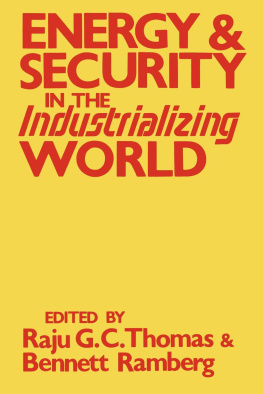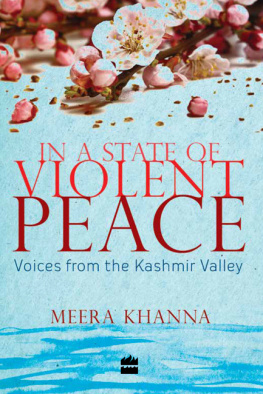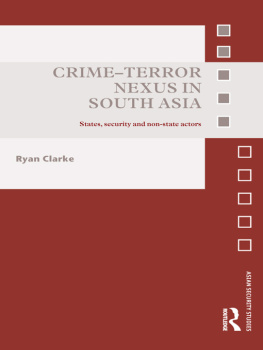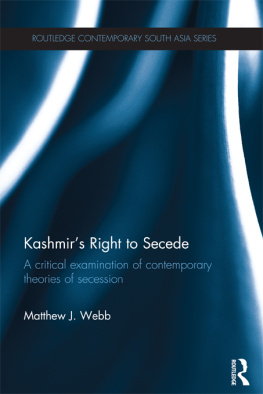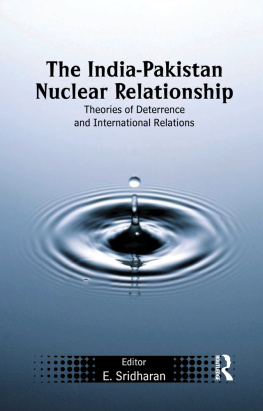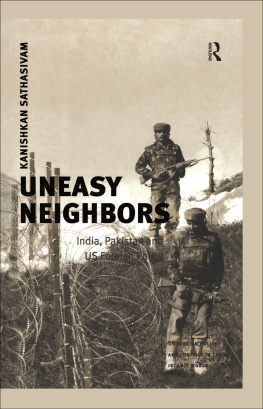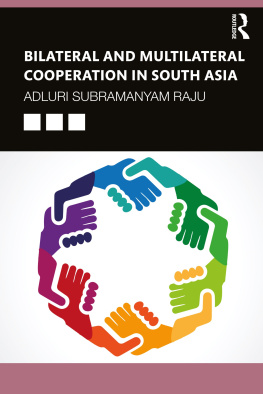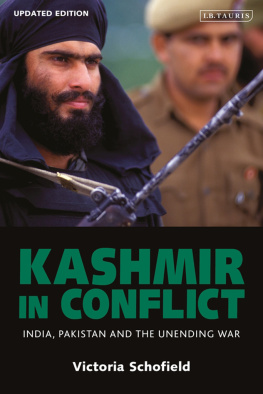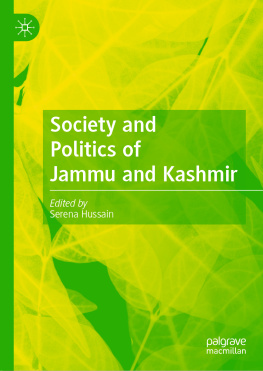First published 1992 by Westview Press, Inc.
Published 2019 by Routledge
52 Vanderbilt Avenue, New York, NY 10017
2 Park Square, Milton Park, Abingdon, Oxon OX14 4RN
Routledge is an imprint of the Taylor & Francis Group, an informa business
Copyright 1992 Taylor & Francis
All rights reserved. No part of this book may be reprinted or reproduced or utilised in any form or by any electronic, mechanical, or other means, now known or hereafter invented, including photocopying and recording, or in any information storage or retrieval system, without permission in writing from the publishers.
Notice:
Product or corporate names may be trademarks or registered trademarks, and are used only for identification and explanation without intent to infringe.
Library of Congress Cataloging-in-Publication Data
Perspectives on Kashmir: the roots of conflict in South Asia /
[edited by] Raju G.C. Thomas.
p. cm.
Includes index.
ISBN 0-8133-8343-9
1. Jammu and Kashmir (India)Politics and government. 2. South
AsiaPolitics and government. I. Thomas, Raju G.C.
DS485.K27P47 1992
954'.6dc20 91-26056
CIP
ISBN 13: 978-0-367-28273-8 (hbk)
The continued armed violence in Kashmir and the rising probability of another Indo-Pakistan war prompted this edited volume, which is intended to provide a variety of perspectives on the nature of the Kashmir problem. In searching for contributors, I tried to ensure that there would be a fair distribution of Indians, Pakistanis and other nationalities; Hindus, Muslims and other religious groups; different ethnic groups from the subcontinent, including Kashmiris of different religious backgrounds; and a variety of political perspectives among the same and different nationalities. It was important to me that the bulk of the perspectives was provided by individuals who are, or were originally, from the subcontinent. I felt that their viewpoints and insights were more likely to provide the reader with a true sense of attitudes and feelings on the subcontinent.
Many of those whom I initially approached responded with chapters. Since not everybody I approached submitted chapters, the "balance" that I sought to maintain in the book meant approaching potential new authors. Even then, not every important or desirable perspective could be represented. For example, despite my efforts, contributions by a Sikh and an "Azad" Kashmiri are not represented in this volume, and a chapter submitted by a Kashmiri arguing for independence was abruptly withdrawn so late in the process that it could not be replaced.
The final "tally" of participants was as follows: Whether active in their religion or not, the contributors--who are originally or currently from South Asia-are comprised of ten Muslims (five Pakistanis, two Indians, two Valley Kashmiris and one Bangladeshi) and nine non-Muslims (including four Indian Hindus, two Indian Christians, two coauthoring Kashmir Hindu Pundits and one Dogra Kashmiri Hindu). Additionally, the contributors include an American and an Englishman.
The reader should keep in mind that although most of the contributors are from academia, the book is directed at policy-makers as well as the general public. In any case, it is doubtful whether there can be pure "academic objectivity" even among academics when dealing with an ongoing, burning crisis in international politics such as the one in Kashmir. Even when the facts presented are the same, the interpretations of them can be significantly different. Every chapter in this volume is virtually a self-contained story, assembling various facts and arguments to provide each contributor's perspective on the Kashmir problem. Thus, the chapters attempt to persuade the reader in one direction or another-whether or not "objectivity" was the original intention of the author. In some cases, I asked the contributor to represent a particular point of view. However, my hope is that a comprehensive reading of all the chapters will provide a reasonably balanced overview of the Kashmir problem.
As the Kashmir crisis continued in 1991, I felt a certain degree of urgency to bring this book out as soon as possible, so that academics, policy-makers and the public, especially in the United States, would have access to both old and new thinking on the nature of the problem. Needless to say, the goal of bringing the book out within a year met with many setbacks. The large number of contributors, many of whom live overseas in India, Pakistan and Britain, the short time span for organizing the book and my teaching and other writing commitments produced a stressful agenda. There were other constraints arising from the lack of funding for the project. Except for my usual annual departmental funding and research assistance from Marquette University, the project was undertaken on a shoestring budget without financial support from any foundation, organization or institution.
The goal of bringing the book out as quickly as possible also necessitated my first adventure in desktop publishing to get the book in camera-ready form, My departmental colleague and friend, Professor John McAdams of Marquette University, was generous with his time and effort and taught me everything I know in this business. He and Stephen Hollingshead helped bring the book to its final form. I was assisted in the typing and proofreading of the manuscript by my graduate research assistants, Kamla Bhatt, Debra Korth, Stephen Hollingshead and Rebecca Finley. The department's administrative assistant, Josephine Morstatter, also assisted me with the typing. My wife, Suzanne, assisted me considerably in the editing process. The editor and editorial assistant at West view Press, Susan McEachern and Alison Auch, were helpful with advice and assistance in getting the book in final form before it went to press. To all these persons, I would like to express my gratitude.
My hope is that this variety of perspectives on Kashmir will clarify the issues, enlighten academics, policy-makers and the public, provide useful ideas and lessons in dealing with the crisis in Kashmir and--in a modest way-contribute to a peaceful resolution of the problems in the near future.
Raju G.C. Thomas
1
Reflections on the Kashmir Problem
Raju G.C. Thomas
Raju George Curian Thomas is Professor of Political Science at Marquette University, and Visiting Fellow at the International Institute for Strategic Studies in London, 1991-92. He was formerly a visiting scholar at Harvard University, the University of California at Los Angeles, and the Massachusetts Institute of Technology. He is the author of The Defence of India: A Budgetary Perspective, Indian Security Policy, Security and Democracy in South Asia (forthcoming), and contributing editor of The Great Power Triangle and Asian Security, and Energy and Security in the Industrializing World. A native of Kerala, India, Raju Thomas was educated at Bombay University, the London School of Economics, and U.C.L.A. from where he received his Ph.D.


